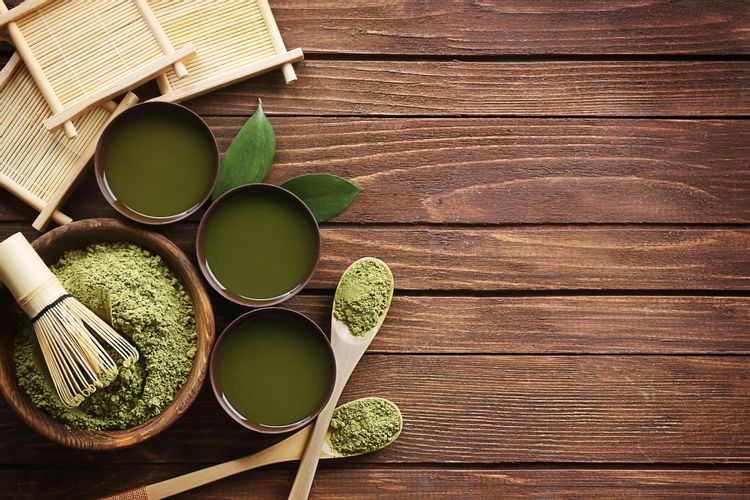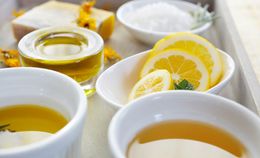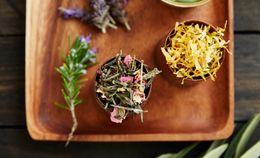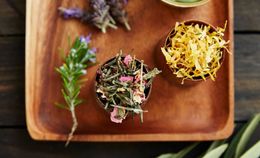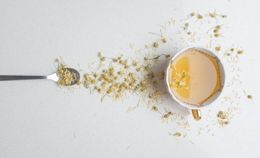Small Intestinal Bacterial Overgrowth (also known as SIBO) is one of the “newer” digestive disorders out there even though, historically, many people have suffered from the symptoms of SIBO before there was a formal name for it. Since matters in the gut can be a little grey and ambiguous sometimes, there is often some overlap between disorders, leaving some conditions hidden beyond others or misdiagnosed altogether.
If you are dealing with SIBO chronically or acutely, know that there are herbal therapeutics out there which can offer tremendous support! In this article, I provide you with some of my favorite herbal tools and categories for supporting a gentle balance and clearance or SIBO in the gut. Read on to discover some herbs which you can start using today for support with SIBO.
Herbal Antimicrobials
Incorporating herbal antimicrobials is one of the most essential categories to consider when working with SIBO. Remember that unlike other digestive disorders where there is simply a lack of “good” bacteria in the gut, SIBO is an extreme overgrowth of “bad” bacteria. This is why people with SIBO often feel more bloating or a flare in symptoms when they take probiotics or probiotic-rich foods and beverages.
It is essential to help clear out surplus of “bad” bacteria in order for additional “good” bacteria to be re-introduced a flourish in the gut. In a nutshell, herbal antimicrobials can help clear out the “bad” without destroying the “good” that is still there. Some of my favorite herbal antimicrobials to incorporate for SIBO support are Oregon grape root (Mahonia repens), oregano (Origanum vulgare), thyme (Thymus vulgaris), and goldenseal (Hydrastis canadensis).
Inflammation Modulation
If you have been reading my other herbal therapeutic articles, you might have noticed that I mention the benefits of incorporating inflammation-modulatory herbs in almost every one. Well, they truly are that important! And applicable across the board for helping support so many different conditions including SIBO. Essentially, rampant inflammation is one of the core roots for many chronic illnesses and diseases. Through learning and applying a variety of tools, including different herbs, our inflammatory responses can be modulated in a sustainable way so that that symptoms are not simply covered up, but reversed.
A few of my go-to herbs for impactful and long-term inflammation support are turmeric (Curcuma longa), calendula (Calendula officinalis), and ginger (Zingiber officinale). These herbs can be used for acute inflammatory relief (i.e. during a flare of symptoms) and long-term for root-based support. Since they are all quite drying in nature, be conscious of balancing them with other moistening herbs like slippery elm bark (Ulmus fulva) or licorice root (Glycyrrhiza glabra) for instance.
GI Motility-Enhancers
If you suffer from the loose-stools end of SIBO symptoms, you might be wondering why you would want to enhance motility in the GI (gastrointestinal system) if the motility is already moving too fast? Well, motility-enhancing herbs don’t necessarily mean laxative herbs, they simply help regulate overall or specific GI-motility function! When we deal with symptoms like chronic constipation or diarrhea (both of which can be connected with SIBO), the motility function of our GI is either moving too slow or way too fast. Fortunately, there are several different herbs you can incorporate to help restore healthy GI motility function. One of my favorite herbs to help support normal GI motility is Turkish rhubarb (Rheum palmatum).
If dealing with acute (or chronic) diarrhea, it is often helpful to employ certain astringent herbs as well to staunch the flow and slow down transit time. Raspberry leaf (Rubus idaeus) and agrimony (Agrimonia eupatoria) are two of my go-to astringents to draw from here. If chronic constipation is more your issue, using herbs like slippery elm bark and psyllium husk (Plantago scabra) would be more helpful. Eating a high fiber diet is necessary too of course.
Every Body Is Unique
It is vital to remember that every person’s body and symptom picture is always unique to them. Although these herbal therapeutics have been shown to offer support for SIBO directly, keep in mind the other conditions that could be present or involved and the necessity of considering and addressing them all at once. When in doubt, consult your professional healthcare practitioner for a formal evaluation and diagnosis. Self-misdiagnosis (also known as “google diagnosis”) is becoming a more common issue and can often create more harm than benefit.
Do you deal with SIBO or know someone who does? Share this article with them or share your favorite therapeutics in the comments below!

